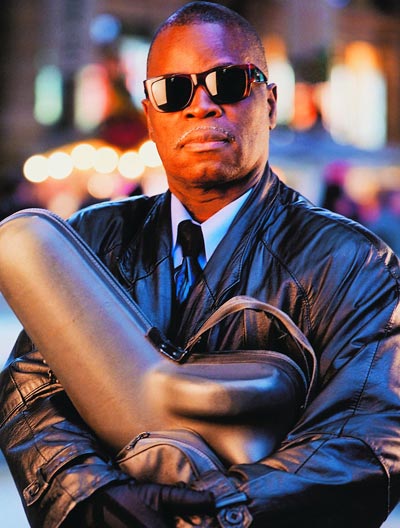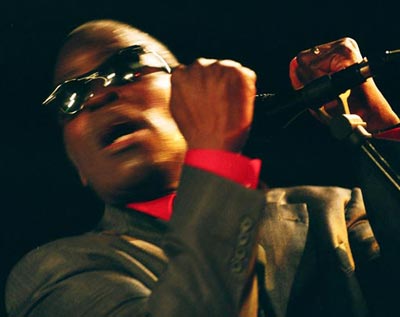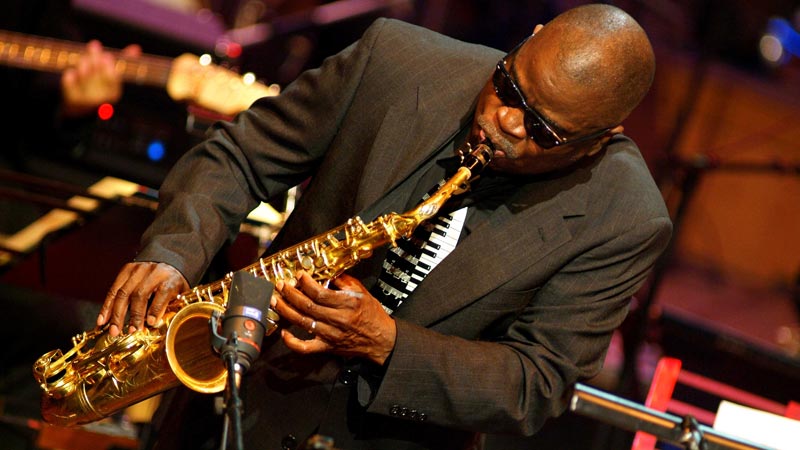The only nervous part about it was I’m standing face-to-face with James Brown! But I still knew what I could do. The same thing if somebody was challenging me to a foot race—chances are I’m going to win, because I knew I was a fast runner.
And you had already backed up Marvin Gaye at that point too.
Yeah, and he never forgot it! He never forgot that. We were college students. I saw him about eight years later, and he remembered it.
 James Brown has a reputation for being a pretty unpredictable person, and your book corroborates that. Is there a particular incident with him that you can say surprised you the most?
James Brown has a reputation for being a pretty unpredictable person, and your book corroborates that. Is there a particular incident with him that you can say surprised you the most?
Surprised me the most… You know what? This may not be what you’re looking for, but the drug use. I had sworn to myself as a high school student that if somehow I got into traveling, playing the saxophone and playing music, that drugs would not be a part of it. That was something that I really, really etched in my mind, and I promised myself that it just wouldn’t be. And when we first got there, he wasn’t doing that. But James couldn’t handle the fact that he was getting older, the footwork stuff was slowing down, and he just got into the drug abuse. Missing gigs and forgetting stuff on stage and all that. That’s what really surprised me most. Because it was so much a change from when we first met.
As much of a tyrant as he could sometimes be, you seemed to take pity on him, especially in the ’80s. Did you feel sorry for him at all?
Yeah. But especially before we even met him, he was really, really strong into his thing. I think I’ve said it before, that James Brown created the music because he had to have something to dance to. He knew he had the ability to dance, with all those splits and stuff. To me, that should have been strength enough to keep him going full steam ahead, rather than give in to the drug thing.
There was a movie this year about James Brown, in which you were portrayed by the actor Craig Robinson, Get on Up. What were your thoughts on it?
I feel like every time they had Craig Robinson, as me, open my mouth to speak, I’m swearing, and it wasn’t like that. We didn’t swear to each other like that. When we got together and James wasn’t around, sometimes we’d just do it, but it wasn’t 100 percent. People that know me say, “Oh my God. Oh my goodness, why are you …” Every time the guy opens his mouth, he’s swearing! I wasn’t brought up like that.
I also happened to recently be in New York with Jack Bart, the son of Ben Bart, James’ manager. Ben Bart was played by Dan Aykroyd, and after the movie he and I was talking. He said, “Maceo, remember the funeral scene where James is throwing dirt on my dad’s casket in the ground?” I said, “Oh yeah, I remember that.” He told me the way it actually went, James didn’t even come to the funeral!
There’s also an argument in that movie that you have with James during rehearsal. Did that argument really happen?
No part of that. They felt like they wanted to write it like they did. I don’t remember ever having any argument about time signatures, because even if we thought stuff was “wrong,” we would do it anyway because it’s James Brown, if that’s what he hears. You know what I mean? “Wrong” is probably a strong word. Maybe I’ll say “different” rather than “wrong,” but it’s James Brown, and we would do it if that’s the way he hears it.
You’ve talked a little bit about the emergence of hip-hop, and how you always liked the music but wished the artist would credit and compensate the original sources for samples. How have royalties from sampling been for you?
If anything, all of it went to James Brown. I didn’t really demand credit back then. I just felt like my hands were tied a little bit in demanding, and maybe that’s what he wanted. In fact he even released some stuff, like Maceo & the Macks, with “Soul Power ’74,” that I was not compensated for. That’s just the way it was.
With that in mind, how did it feel to have De La Soul get in touch with you, and want you in the studio to play live on their album?
That’s what you want! We were exploited a lot. You learn as you go and it’s the nature of how it’s done. Sometimes you’re exploited and sometimes you’re not.
Another person that hired you instead of sampling you is Prince, who you played with for several years. You tend to respect his privacy, and say simply that he’s genius. What did you learn from your time playing with him?
That I was right: he is a genius. The sensitive thing about his privacy still holds, because I promised that to him, but he is a sweetheart and a genius, and I’ll always love him. I don’t say too much about it, but I respect his wishes. From my small time that I had working with him, it was beautiful. I will always treasure those times.
 Your whole life has been interwoven with civil rights, from the first time you saw Ray Charles and there was a rope separating the audience, to your older brother’s work with the civil rights movement, to the show you played with James Brown in Boston after Dr. King was assassinated. We’ve got protests going on all over the country right now from the Ferguson case, and the Eric Garner case. What do you make of the aftermath of these cases?
Your whole life has been interwoven with civil rights, from the first time you saw Ray Charles and there was a rope separating the audience, to your older brother’s work with the civil rights movement, to the show you played with James Brown in Boston after Dr. King was assassinated. We’ve got protests going on all over the country right now from the Ferguson case, and the Eric Garner case. What do you make of the aftermath of these cases?
I don’t like the destructive part, the “let’s burn this” and all that, but clearly there has to be something. You got to be in some protests, but peaceful protests. That’s my take on it. And this is what I think a little bit about law enforcement: First of all, you have to weigh the situation. And then, in that weighing of the situation, think, “Is this worth somebody dying?” With the law enforcement people, those with the weapons and the chokeholds and all that, is it worth perhaps somebody dying?
I mean, “I can’t breathe.” I can’t breathe means I can’t breathe. I know my strength. If I’m gritting my teeth, which means I’m trying to use all the strength that I have for five or six minutes or whatever it is around your neck, then I don’t care what the outcome is. I’m trying to really, really hurt somebody. It’s not like I got the guy by the shoulder or the arm or the foot. He’s got him by the neck, and he’s saying with a little voice, “I can’t breathe. I can’t breathe,” and this doesn’t matter? Come on now.
In the framework of police procedures and law, there’s got to be a moment of… somebody’s got to back off a little bit. Somebody got to back off a little bit from normal standard procedures. Somebody’s got to back off a little bit if it looks like whatever it is, it’s going to lead to somebody dying. Why didn’t we just come up with something where nobody dies? That’s all I’m saying.
After all the civil-rights advances that you participated in—it’s been 50 years since the lunch counter protest in Greensboro, where you were going to college—are you surprised that after 50 years we’re still facing the same issues?
A little bit. It’s hard for me to understand how people could have slavery and then go to church on Sunday and everything is cool. It’s hard for me to get past that. But that’s the way it was. And there’s lot of people in the South whose ideologies from way back then, some of it is still going on, really. It’s part of people’s character, part of their upbringing and part of their creed, part of their culture.
That’s why it’s so important and so rewarding to be on the stage and there’s no division, there’s no split, there’s no A-side or B-side. Everybody wins, nobody loses. That’s what is so enjoyable about entertaining. It’s just entertaining. That’s what we do.
It sounds like what’s most important to you is bringing people together, especially in a atmosphere right now that’s tense.
Yeah, exactly. I was even thinking how can musicians, how can entertainers … how can we go and diffuse some situations? Music, it just makes people’s lives better and helps them think better, and have positive thoughts. Hopefully you can get it to those who for whatever reason have negative thoughts. Sometimes they can get things to listen to and just make it better.
If you do come to my show, you’ll hear me say all the time throughout my performance, “We love you. We love you. We love to love. We love you.” I just like ending it that way. “On behalf of all of us, always remember, always remember: we love you.”

 James Brown has a reputation for being a pretty unpredictable person, and your book corroborates that. Is there a particular incident with him that you can say surprised you the most?
James Brown has a reputation for being a pretty unpredictable person, and your book corroborates that. Is there a particular incident with him that you can say surprised you the most? Your whole life has been interwoven with civil rights, from the first time you saw Ray Charles and there was a rope separating the audience, to your older brother’s work with the civil rights movement, to the show you played with James Brown in Boston after Dr. King was assassinated. We’ve got protests going on all over the country right now from the Ferguson case, and the Eric Garner case. What do you make of the aftermath of these cases?
Your whole life has been interwoven with civil rights, from the first time you saw Ray Charles and there was a rope separating the audience, to your older brother’s work with the civil rights movement, to the show you played with James Brown in Boston after Dr. King was assassinated. We’ve got protests going on all over the country right now from the Ferguson case, and the Eric Garner case. What do you make of the aftermath of these cases?
